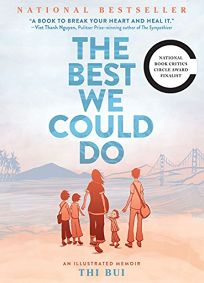Bui shares her fear that she will “pass along some gene for sorrow.” Then she creates a space for readers to see the hope that comes with the birth of a child. She allows readers to accompany her on her journey to assimilation, love, and parenthood. Bui never tells us what we should think about her life; instead, she makes us a part of her passage.
Bui uses humor with a deft hand. When her father, Bô, arrives in the U.S., a volunteer from U.S. Catholic Charities drives him from Chicago’s O’Hare Airport to his family in nearby Hammond, Indiana. A panel shows the two sitting on the expressway as Bô gazes out and asks “Why is it so ugly here?” Bui’s illustration of winter’s exposure of the industrial Midwest is apt as is her panel of the Hammond home where her family first lived in the U.S. Bui captures the stark reality of barren trees and snow-covered sidewalks alongside small houses set inside chain link fences that encompasses much of Hammond and industrial cities like it. Her single panel shows how immigrants arriving from tropical climes might feel when seeing dirty snow and no vegetation.
“Nothing that happened to me makes me special. But my life is a gift that is too great, a debt I can never repay.” However, Bui does repay that debt by using her talents: her gift of illustration and her gift of using just the right words to share her story. Readers will also see that Bui’s day job as a public school teacher helps her teach her readers about Viet Nam, its people, and its history in a way we may never have understood it previously. I heartily echo Pulitzer Prize winner Viet Thanh Nguyen’s observation. This is “a book to break your heart and heal it.”
Summing it Up: Thi Bui’s arresting images and her clear words offer a portrait of motherhood and of the price we all pay for war. The Best We Could Do is a powerful meditation on finding meaning in the life we’ve been given. Everyone should read this book and share it. Prospective readers should visit the publisher’s site to inhale Bui’s powerful two-color images.
Note: The Best We Could Do is adult nonfiction, but if I were teaching the Viet Nam War to students ages 14 and older, I’d make this my text.
Rating: 5 stars
Category: Five Star, Grandma’s Pot Roast, Nonfiction, Super Nutrition, Book Club
Publication date: March 7, 2917
Author/Illustrator Website: http://www.thibui.com/
Read an Excerpt: https://www.abramsbooks.com/product/best-we-could-do_9781419718779/
Interview with the Author: NBC News: http://www.nbcnews.com/news/asian-america/best-we-could-do-thi-bui-honors-family-s-immigration-n726626
Syllabus for a class on Asian-American
graphic narratives at Queens College, CUNY with links to interviews and
reviews:
What Others are Saying:
Publishers Weekly: http://www.publishersweekly.com/978-1-4197-1877-9
Thi Bui’s stark, compelling memoir is about an ordinary family, but her story delivers the painful truth that most Vietnamese of the 20th century know in an utterly personal fashion — that history is found in the marrow of one’s bones, ready to be passed on through blood, through generations, through feelings. A book to break your heart and heal it. — Viet Thanh Nguyen, Pulitzer Prize-winning novelist

No comments:
Post a Comment